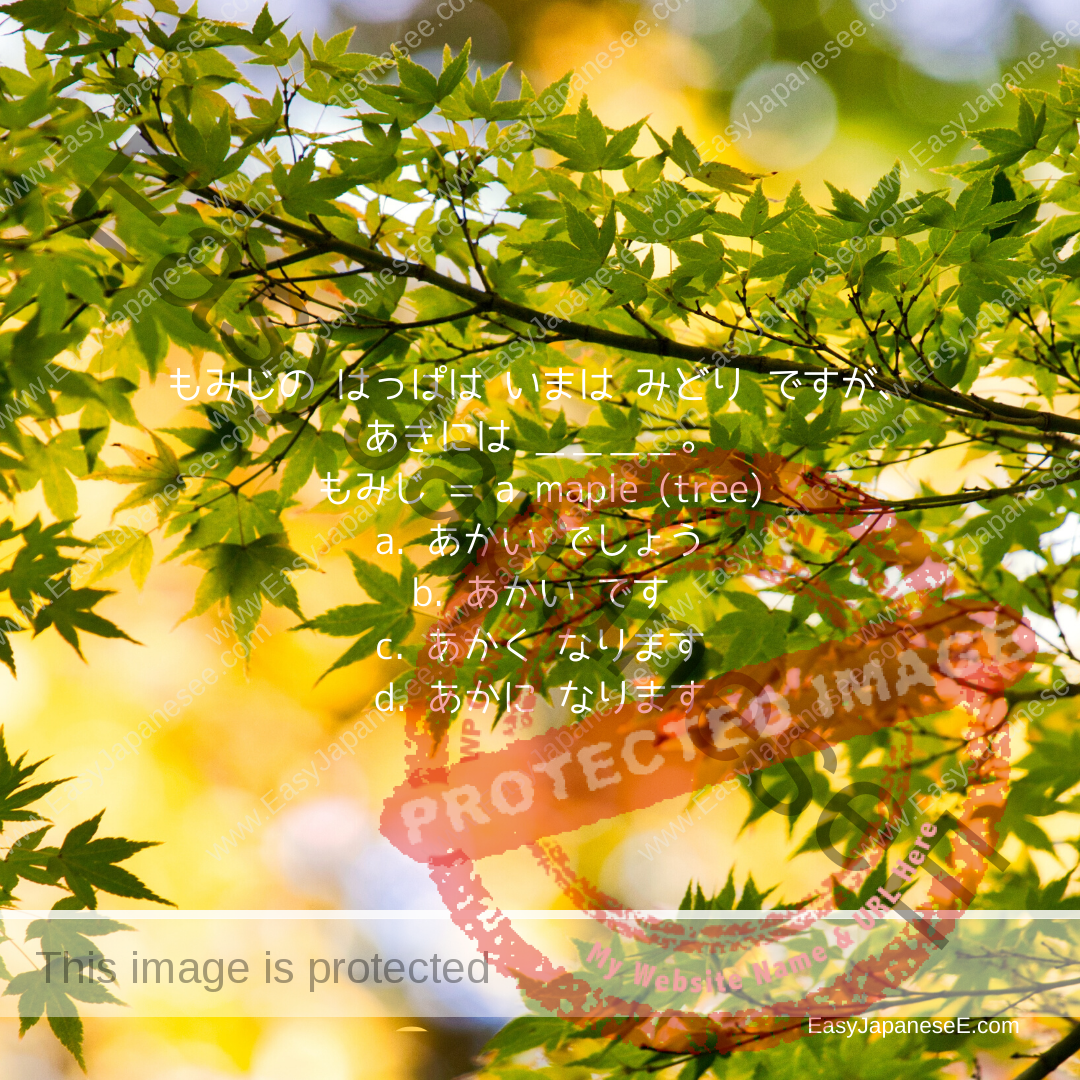Today’s Question
もう夏(なつ)ですね。もみじの はっぱは いまは みどり ですが、あきには ____。
もみじ = a maple (tree)
- あかい でしょう
- あかい です
- あかく なります
- あかに なります
Today’s Grammar Point: ~く/~に なります
なります is the most common word that describes a change. Although なります can be used with many other words and have various meanings, the most basic meaning is “to become ~.”
Connection
- [noun] + に + なります
- [なadjective] + に + なります
- [いadjective stem] + く + なります
“いadjective stem” means “いadjective” minus the ending い
Examples with a noun
ジョンさんは えいごの せんせいに なりました。
John became a teacher of English.もうすぐ 五時に なります。
Soon it will be 5 o’clock.わたしは ピアニストに なりたいです。
I want to be a pianist.
Examples with a なadjective
はやく げんきに なってください。
Please get well soon.ことしから てつづきが かんたんに なりました。
The procedure was been made simpler this year. (This year, the procedure became simpler.)せいとが いえに かえって、学校は しずかに なりました。
Students went home and the school became quiet.
Examples with an いadjective
5時ごろから みせが いそがしく なりました。(いそがしい = busy)
The shop got busy from around 5 pm. (This suggests it wasn’t very busy until 5 pm.)らいげつから このサイトが もっと おもしろく なります。(おもしろい = interesting)
This site will become more interesting from next month.えいがを みて、メアリーさんは かなしく なりました。(かなしい = sad)
Mary watched the movie and felt sad.
When a colour changes
There are 6 colour words in Japanese which can be used as a noun as well as an いadjective by adding い afterwards. They are:
あか (red), あお (blue), しろ (white), くろ (black), きいろ (yellow) and ちゃいろ (brown).
When the colour of something changes to one of the above 6 colours, you have to think of how the change occurs.
If the change is natural and gradual, like leaves turning red or yellow, an いadjective is used, so the sentence should end in ~く なります.
If the change is mechanical, like turning a switch, we prefer using the noun form, so the sentence should end in ~に なります.
Examples
The maple leaves will turn red. (natural, gradual)
(✓)もみじの はっぱが あかく なります。
(✖)もみじの はっぱが あかに なります。Emma blushed. (natural).
(✓)エマさんは あかく なりました。
(✖)エマさんは あかに なりました。My mum’s hair has turned completely white (because of her age).
(✓)ははの かみは すっかり しろく なりました。
(✖)ははの かみは すっかり しろに なりました。The traffic light changed red. (mechanical)
(✖)しんごうが あかく なりました。
(✓)しんごうが あかに なりました。The new card has changed to black. (artificial)
(✖)あたらしいカードは くろく なりました。
(✓)あたらしいカードは くろに なりました。
Answer to Today’s question: c
The sentence says: “It is already summer. Maple leaves are green now but they _____ in autumn.”
Because it is talking about maple leaves, not any leaves, the blank should be filled with “turn red” or “become red.” You need to choose the verb with the meaning of “turn/become.” です/でしょう do not have that meaning. The best answer is c. They turn “red” and this process is natural, gradual, so we prefer the いadjective, あかい, to the noun form あか (shown in the choice d).
Related post: 青い vs 青の


2 Replies to “~くなる vs ~になる”